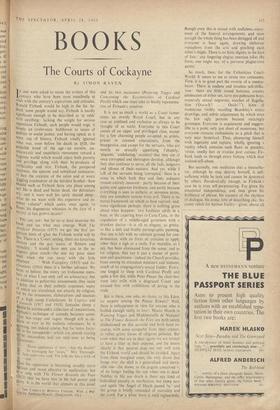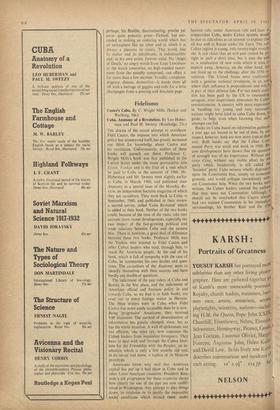BOOKS
The Courts of Cockayne
By SIMON RAVEN
Ii I .4 Ir one were asked to name the writers of this century who have been most manifestly at odds with the, century's aspirations and attitude, Ronald Firbank would be high in the list. In- deed, some people would say, Firbank is hardly significant enough to be described as 'at odds' with anything: lacking the weight for serious opposition Firbank, such people would urge, is simply an irrelevance. Indifferent to issues of Politics or social justice, and having opted, as it were. out of history, Firbank totally ignored 'that was, even before his death in 1926, the Palpable trend of the age—an earnest, un- aristocratic and unaesthetic movement toward a hYgienic world which would reject both poverty and privilege along with their by-products of artificiality and vice. Firbank, the pampered squirmer, the epicene and subsidised insinuator, at best the creature of the salon and at worst giggling troubadour of the fetishist brothel—how Should such as Firbank have any place among us? He is dead and better dead, the detractors cry, and it were well his spirit should sleep: what do we want with this expensive and in- solent volume* which .seeks, Once again, to flaunt his degenerate whimsies in the face of a
sOciely at last grown decent? . .
Yes, yes, yes: but let us at least examine the hook and sec what may emerge. With The Artificial Princess (1915) we get the first im- portant hints of ghat the Firbank world will be (eke. There is a 'Court' setting, there are luxurious uevices and the gay scents of flowers and sexuality: 'I would have sent you in the in- cognito glass coach—the one my poor sister Used when she ran away with the little chorister, . .' With Vainglory (1915) and In- ?firm/ions (1916) there is' a further advance. We 4,a.Ye, as before, the weary yet frolicsome mem- bers of what I can only call an aristocracy, but In addition to polyerotic amusements they insist a great deal on their aesthetic responses, many (1))( which are stimulated, not exactly by religion. of by the ornaments, elaborations and nuances ?.'• a high camp Catholicism. In Caprice and v, a/mouth (1917 and 1918), fantasies about a \Muld-be actress and a collection of centenarians, ybank's technique of comedy becomes some- Pat less wispy and vague; though still as de- "Pile as ever in his aesthetic references, he is t' wing, not indeed coarse, but far more force- ' in his innuendoes—which are. almost ceasing
• , be innuendoes and are very. near to being tements:
i :Those appliances of hers:-- that she flaunts!'
• In mtissagmg her "cases."' Mrs. Thorough- .
• _ fare AO/to-core said. 'I'm told she has a trick of, -um? us his apparatus is becoming steadily more u pus and more effective in application; but ,.71s only with The Flower Beneath the Foot ‘J _,923) that we have him in his full power and Vory. It is the world that appears in this novel -,.!...._
- -----
Tir CoN m
)Nki ) i nuts \VII) a Pe- f,Ive and its two successors (Prancing Nigger and Concerning the Eccentricities of Cardinal Pirelli) which one must take as finally representa- tive of Firbank's creation.
It is not so much a world as a Court (some- times an overtly Royal Court, but in any case so confined and exclusive as always to be thought of as such). Everyone in this Court comes of an upper and privileged class, except for a few charming people co-opted, as artists, priests or talented entertainers, from the bourgeoisie, and except for the servants, who are mostly so sexually appetising ('shapely,' `piquant,' undulating,' etcetera) that they are at once corrupted and thereupon develop, although they also continue to serve, all the fads, languors and idioms of their. masters. And yet, while I talk of the servants being 'corrupted.' there is a sense in which both they and their seducers remain entirely innocent : partly because of their gaiety and apparent freshness, and partly because everything is seen in :esthetic or sensuous terms, they are somehow remote from evil. There is no moral framework on which to base reproof; and, more significant perhaps, there is nothing gross about what happens: two Lesbians adrift in a boat, or the capering boys in Cuna Cuna, or the copulation of a middle-aged governess with a drunken doctor--it is all so elegant, so pretty, so like a deft and frothy pornographic painting. that one is left with no relevant ground for con- demnation, with no form of criticism to apply other than a sigh or a smile. For morality, as I say, has been eliminated from the scene; and as for religion, that too is just a matter of pretti- ness and quaintness--indeed the Church provides, from among its attendant ministers and minions, much of its congregation's sexual fodder. Every- one longed to sleep with Cardinal Pirelli and quite a few did, while Peter Passer the choir-boy went into exile with a disgraced Count and amused him with exhibitions of diving in the nude.
BLit is there, one asks, no threat to this Eden. no serpent among the Palace flowers? Well, there is unhappiness in view for anyone who is
foolish enough really to love: Miami Mouth in Prancing Nigger and Mademoiselle de Nazianzi in The Flower Beneath the Foot are both sorely disillusioned on this account and both have re- course. with some sympathy from their creator, to rather grimy forms of religious penance. But even when they are in their agony we are invited to have a titter at their expense. and the lesson clearly is that passion does not suit well with the Firbank world and should be avoided. Apart from these marginal cases, the only doom that hangs over the idyll is a generalised and inevit- able ofie—the doom, as the pagans conceived it, of no longer feeling the sun when one is dead. Neither in life nor death is there any kind of individual penalty or retribution; but every now and again 'the Angel of Death passed )1y,' and the group is briefly reminded of mortality and ihctomb. For a while there is mild melancholy,
though even this is mixed with malicious enjoy- ment of the funeral arrangements; and soon enough the whole thing has been shrugged off and everyone is busy again, drawing elaborate metaphors from the arts and pinching each other's thighs. There is no Stoic dignity in the face of fate: any lingering elegiac emotion takes the
for, might say, of a perverse plague-time
So much, then; for the Firbankian Court- World. It seems to me to invite two comments. First, it is in good part the reverie of a mastur- bator. There is endless and loveless self-titilla- tion: there are little round bottoms, creamy adolescents of either sex, tarty pre-pubescent boys, massively sexual negresses, touches of flagella-
tion ('O-o-o-h? . . . Ouch! !'), hints of monstrous virility recalling Beardsley's erotic drawings, and subtle adjustments by which even the few ugly persons become enticingly grotesque. Everyone is acqUiescent and suggest- ible to a point only just short of monotony, but everyone remains enthusiastic to a pitch that is very near hysterical. Thus, pleasuring himself with ingenuity and rapture, wholly ignoring a reality which contains such flaws as pustules. virtue, smelly feet or tristitia post coition, Fir- bank leads us through every fantasy which ever assisted self-abuse.
But secondly, one meditates that a masturba- tor, although he may destroy himself, is self- sufficient while he lasts and cannot be destroyed by others. Paradoxically enough, in Firbank's case he is even self-perpetuating. For given his emotional independence, and then given his brilliance of phrase, his mastery of the rhythms of dialogue, his ironic loVe of describing chic, his canny relish for human fraility– given. above all perhaps, his flexible, discriminating, precise yet never quite pedantic prose—Firbank has suc- ceeded in making an enduring world which has an atmosphere like no other and to which it is always a pleasure to return. This world, like its maker and its inhabitants, is indestructible and, in his own terms, forever valid. No 'Angel of Death,' no angry words from Lady Lewisham or the watch committee, no high-minded resent- ment from the socially concerned, can affect it for more than a few seconds. Trouble, complaint, disgrace, disease, damnation—it wards them all off with a barrage of giggles and calls for a little champagne from a pouting and dissolute page.















































 Previous page
Previous page